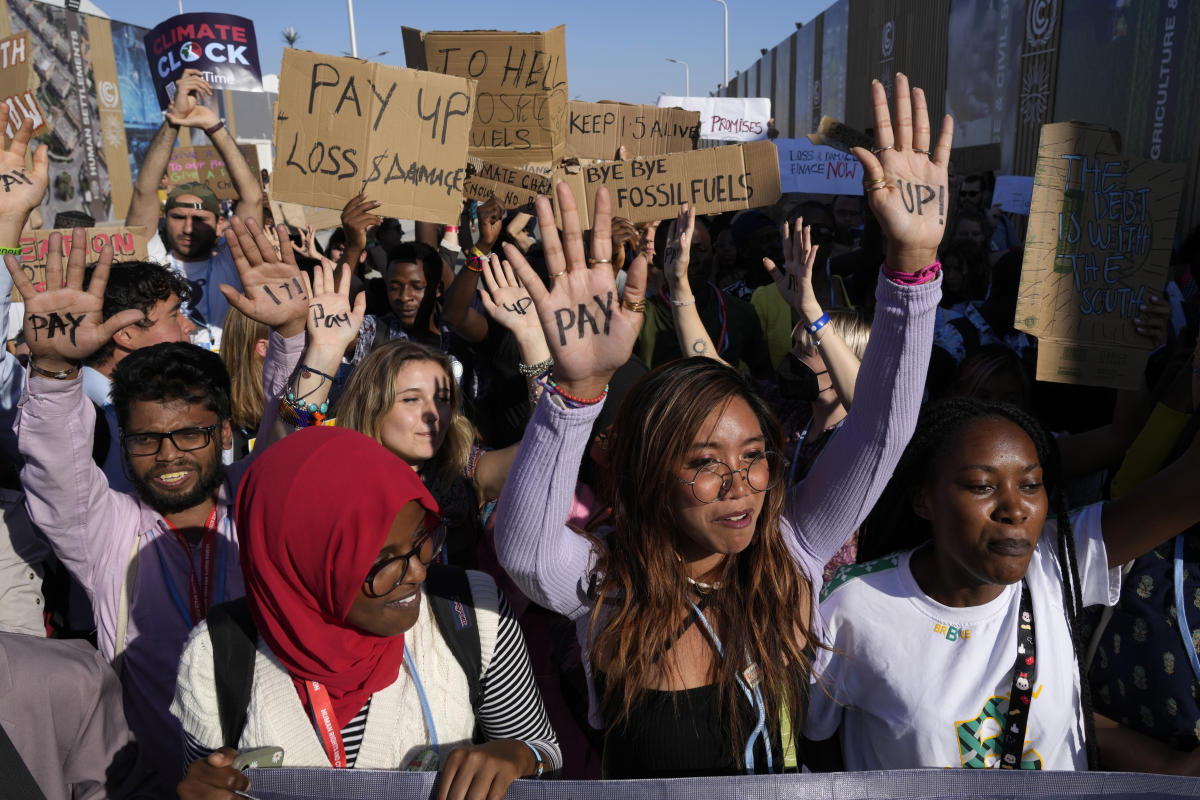SHARM EL-SHEIKH, Egypt (AP) — After two weeks of haggling, officials on Sunday cheered the end of this year’s U.N. climate talks in Egypt, which resulted in the creation of a fund to help poor countries suffering under disasters driven by global warming.
Expectations had been low for major agreements to come out of the meeting in Sharm el-Sheikh, but the recent floods in Pakistan and Nigeria boosted calls for urgent aid now.
The geopolitical fallout from Russia’s war in Ukraine and simmering U.S.-China tensions provided a difficult backdrop for the talks.
Here’s a look at what was achieved, and what fell short, at the climate confab by the Red Sea:
LOSS AND DAMAGE FUND
Countries around the world are already seeing the effects of climate change, from wilder weather to hotter summers and rising sea levels. Poor nations that have contributed least to the problem of greenhouse gas emissions are among the hardest hit. So there were cheers when the idea of a ‘loss and damage’ fund made it onto the official agenda of the talks for the first time.
Industrialized countries had long resisted such a fund, fearing it would put them on the hook for billions of dollars for the decades of they’ve been pumping carbon into the atmosphere. An unexpected offer Thursday from the European Union got the ball rolling and within 48 hours a deal was done. Details still need to be hammered out, but the most vulnerable nations can expect to get cash to cope with climate catastrophes in future.
FINANCE RULES
Donor countries have demanded that the money being channeled to poor nations needs to be aligned with the goals of the Paris accord.
Some developing countries have resisted this, fearing it would distract from discussions over the money rich nations have pledged — but so far not delivered — to help them adapt to climate change and reduce their emissions. Negotiators in Sharm el-Sheikh were unable to reach an agreement on the issue and it will now be taken up again in Dubai, next year.
KEEPING 1.5 ALIVE
Scientists warn that chances are slipping away to cap global warming at 1.5 degrees Celsius (2.7 Fahrenheit) as laid out in the 2015 Paris agreement. Rather than declining, greenhouse gas emissions are still rising.
But there is some progress. Before Paris, the world was heading for 4.5 degrees Celsius of warming by the end of the century compared to pre-industrial times. Recent forecasts have that down to about 2.6 C, thanks to measures taken or firm commitments governments have already made.
Campaigners had hoped countries at the meeting in Egypt would encourage countries to set out more ambitious targets. They were disappointed.
Negotiators agreed to confirm the pledges made at last year’s climate summit in Glasgow, Scotland, but little else. There was no call for major developing world polluters like China and India to cut their emissions sooner.
PUTTING FOSSILS ON NOTICE
Last year’s talks ended with an agreement to “phase down” the use of coal, the first time a fossil fuel has been explicitly named, shamed and given notice at the international level. India, which was unhappy about that move, this year made a surprise call for oil and gas to be phased down too, but the proposal didn’t make the final cut.
Several pacts have been struck between rich and developing nations in recent months to hasten that shift toward clean energy, most recently a $20 billion deal with Indonesia. However there was disappointment among environmentalists that the Sharm el-Sheikh meeting included “low-emission” energy — which some claim includes natural gas, a fossil fuel — in a resolution on the clean energy transition.
METHANE BUBBLING
Glasgow also saw a new alliance of countries including the United States come together and pledge to cut the amount of methane — a powerful greenhouse gas — released into the atmosphere by a third by 2030.
The list of countries supporting that pledge grew this year, to about 150. Even China said it would work to cut methane emissions.
RIGHT TO PROTEST
Human rights issues came to the fore at COP27 due to Egypt’s history of repression and the high-profile case of imprisoned activist Alaa Abdel-Fattah. His fate was raised by numerous foreign leaders in meetings with their Egyptian counterparts, but the activists remains in jail. His family said he was “very very thin” after ending a hunger strike that prompted widespread concern for his health.
CARBON CREDITS
Long-running discussions about emissions trading rules failed to make much headway.
Climate campaigners criticized that existing loopholes in already weak rules for emissions trading markets could allow polluters to keep pumping carbon into the atmosphere while claiming they’re meeting international targets — by simply paying others to offset their emissions.
Experts said current rules hamper transparency and important language on protecting human rights was watered down, prompting fears that Indigenous peoples in particular could suffer as a result of carbon markets, say by being forced to leave their ancestral lands to make way for forestry projects used to sell emissions offsets.

